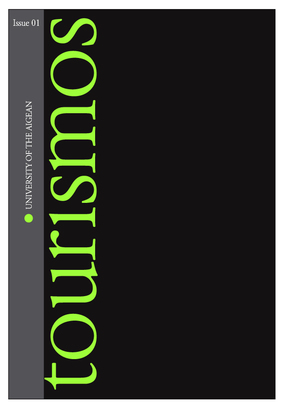Tourism, cultural heritage and e-services : using focus groups to assess consumer preferences
Part of : Tourismos : an international multidiciplinary journal of tourism ; Vol.7, No.1, 2012, pages 41-59
Issue:
Pages:
41-59
Section Title:
Research papers
Author:
Abstract:
This paper discusses the use of in-depth focus groups to assess residents, tourists and other stakeholders’ preferences for e-services that would enhance access to cultural heritage in Amsterdam, Leipzig, and Genoa. Several e-services are mentioned, and in particular the integration of e-services in these cities is highlighted. The way this integration takes place very much relates to the maturity of each city in terms of cultural tourism, and information and communication technology (ICT). Our results show that the need for tailored information (profiling), interactive maps (geospatial dimension), booking service “one-stop shops”, and consumer-generated content were all common in the three cities. In some cities the focus groups expressed a need for various forms of e-governance. Mobile devices and navigation systems were also high on the agenda in the more ICT-advanced cities.
Subject:
Keywords:
e-tourism, focus groups, e-services, consumer preferences
Notes:
Περιέχει σχήματα, πίνακες και βιβλιογραφία
References (1):
- Aichholzer, G. (2003). PRISMA strategic guideline 6: eTourism. PRISMA project. Http://www.prisma-eu.net Accessed the 10 th of January 2012, at 10:20 CET.Alberini, A., Longo, A. & Riganti, P. (2006). Using Surveys to Compare the Public’s and Decision Makers’ Preferences for Urban Regeneration. The Venice Arsenale, SIEV – Sustainability Indicators and Environmental Valuation. Nota di Lavoro 137.2006. Venice, Italy: November 2006.Bogardus, E.S. (1926). The group interview. Journal of Applied Sociology, Vol. 10, pp.372-382.Buhalis, D. (2003). e-Tourism: information technology for strategic tourism management. U.K., Prentice Hall.Cameron, J. (2005). Focusing on the Focus Group. In Iain Hay (Ed.) Qualitative Research Methods in Human Geography, 2nd ed. Melbourne, Oxford University Press.DigiCULT Report (2002). DigiCULT. European Commission Directorate-General Information Society, January, 328 pages.Dobson G. & Kalish S. (1993). Heuristics for Pricing and Positioning a Product-Line Using Conjoint and Cost Data. Management Science, Vol. 39, No.2, pp.160-175.Greenbaum, T.L. (2000). Moderating focus groups: a practical guide for group facilitation. London, Sage Publications.Hibbard, J.H., & Jewett, J.J. (1996). What type of quality information do consumers want in a health care report card? Medical care research and review, Vol. 53, pp.28-47.Krueger R.A. & Casey M.A. (2000). Focus groups: a practical guide for applied research. Thousand Oaks, Sage Publications.LaChance-Porter, S. (1993). Impact of user focus groups on the design of new products. In Proceedings of the 14th National On-line Meeting, Learned Information, Medford, NJ, pp. 265-271. .McDonagh-Philp D. & Bruseberg A. (2001). The Use of Focus Groups in Design Research: A Literature Review. URL: Http://www.cs.bath.ac.uk/~anneb/CoDesign2001_FG.pdf Accessed the 10 th of January 2012, at 10:23 CET.Michopoulou, E. & Buhalis, D. (2006). Developing an eTourism Platform for Accessible Tourism in Europe: Technical Challenges, School of Management Working Paper, Surrey, UK: University of Surrey.Morgan, D.L. (1990). Focus Groups as Qualitative Research. Newbury Park, Sage Publications.Morgan, D.L. (1997). Focus groups as Qualitative research (2nd ed.). London, Sage Publications.Morgan, D.L. (1996). Focus groups. Annual Review of Sociology, Vol. 22, pp. 129-52.Patton, M.Q. (2002). Qualitative research and evaluation methods. 3rd Edition. London, Sage Publications.PRISMA Project (2002). Future trends for eTourism Services. August 2002, Http://www.prisma-eu.net/deliverables/trendtour.PDF. Accessed the 10 th of January 2012, at 10:25 CET.Rayman-Bacchus, L. & Molina, A. (2001). Internet-based tourism services: business issues and trends. Futures, Vol. 33, pp.587-605.Riganti, P., Nese A. & Colombino, U. (2006). A Methodology for Eliciting Public Preferences for Managing Cultural Heritage Sites: An Application to the Temples of Paestum. In M. Giaoutzi and P. Nijkamp (Eds.) Tourism and Economic Development, Ashgate: Aldershot, UK.The Scottish Parliament (2002). Tourism e-business. SPICe Briefing, produced for the Enterprise and Lifelong Learning Committee 02/93, (August 21 2002): 1-21.Simon-Rusinowitz, L. & Mahoney, K.J. (1997). Determining consumer preferences for a cash option: Arkansas survey results. Health Care Financing Review, Winter 1997, Vol. 19, Issue 2, pp.73-96.Sofaer, S. (1996). Identifying the Special Needs of Medicare Beneficiaries. Paper presented at the Quality and Choice Conference, Arlington, Virginia: October 29 1996.Stewart, D.W. & Shamdasani, P.N. (1990). Focus Group: Theory and Practice. London, Sage Publications.




